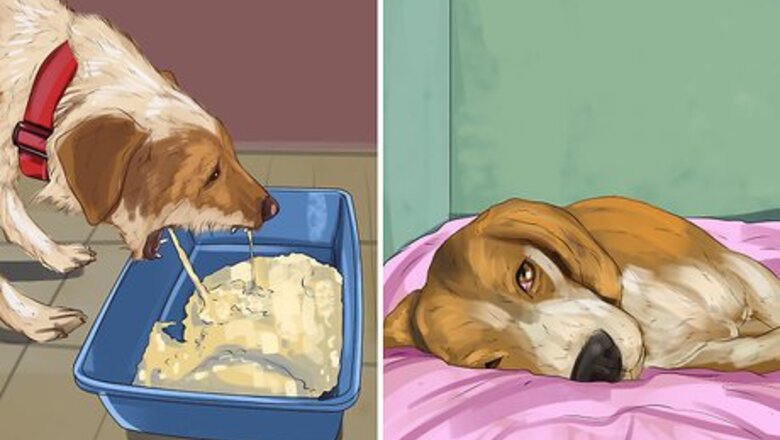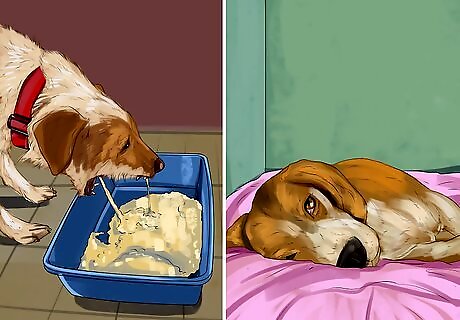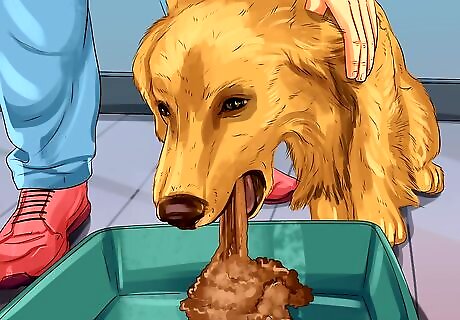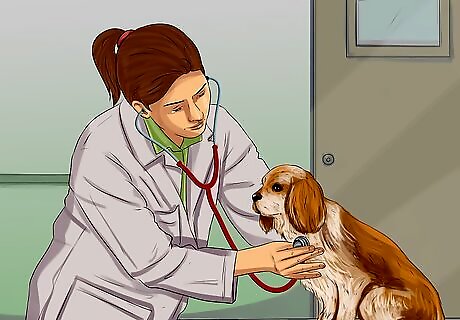
views
Providing Immediate Care

Recognize the symptoms of aspirin poisoning. The moment any symptom presents itself, you should call your vet or the pet poison control line. If you suspect your dog has swallowed too much aspirin, get help immediately, even before symptoms show. Common symptoms include: Loss of appetite Vomiting Drooling and panting Tremors/Seizures Coma Lethargy Hypoxia (not getting enough oxygen) and difficulty breathing An arched back, indicating abdominal pain Brown discoloration of the gums due to the production of methemoglobin Blue discoloration of the gums due to lack of oxygen Shock, which is recognizable if your dog isn't responsive or suddenly collapses

Call the vet or the pet poison hotline. Call your vet, the local animal hospital, or the pet poison control line the moment you notice symptoms. They will be able to talk you through stabilizing your dog in-the-moment, and help you determine what kind of medical care will be necessary once your dog is stable. The phone number for the ASPCA animal poison control helpline in the U.S. is (888) 426-4435.

Stabilize your dog as directed by your vet. Aspirin poisoning may result in oxygen deprivation, hyperthermia, bleeding from ulcers, and/or systemic acidosis. Before treatment can be given, the animal first needs to be stabilized to prevent any of these problems. Your vet or the pet poison control line will talk you through what you need to do based on your pet’s symptoms. Depending on your dog's symptoms, stabilization may include opening your dog's airways, limiting your dog's movement, and or helping your dog take in fluids.

Induce vomiting to force the aspirin from the dog's stomach. Inducing vomiting can remove aspirin from your dog’s stomach before its body has the chance to absorb it. If inducing vomit is necessary, your vet or the pet poison control line will walk you through the proper steps. 3% Hydrogen peroxide is given orally to induce vomiting in dogs. The dose of hydrogen peroxide is a maximum of 45 mL for all ages and weights of dog. The affected dog should vomit within 15 minutes. However, you should be aware that vomiting is not advisable for some dogs, especially if it has no symptoms or if they suffer from other conditions. Only induce vomiting under the instruction of a vet or the pet poison control line.
Getting Emergency Help

Take your dog to the vet or animal hospital. As soon as your dog is stable, it needs to get veterinary help. See if your vet is able to take your dog for an emergency appointment. If they cannot accommodate your dog, take it to the nearest animal hospital as soon as possible. Even if you manage to induce vomiting before any serious or critical symptoms develop, it will need immediate vet care.

Talk to your vet about medical treatment. There is no specific therapy for aspirin poisoning in dogs. In some cases, your vet may prescribe medicine to reduce acid production or to provide a protective barrier in the dog's stomach. In other cases, they may have to pump your dog’s stomach in a procedure known as a gastric lavage. This is a common treatment that will remove the aspirin from your dog's digestive system so that symptoms won't get any worse. The right treatment will depend on your dog’s size, age, overall health, and current symptoms.

Ask your vet about supportive care. Once the immediate threat of poisoning has passed, your dog will need supportive care to help it recover. This may include IV fluids, medication to help protect the stomach and kidney, or even blood transfusions. Your vet will develop a supportive care plan that encompasses both in-clinic and at-home care. Don’t be afraid to ask questions if you’re unsure about what a part of your pet’s care plan means. They can explain it to you and show you how to do any processes with which you may be unfamiliar. When your dog returns home from the vet or animal hospital, be prepared to be gentle with it for the first few days. You may need to limit activity and allow more time for rest and recovery.
Preventing Aspirin Poisoning

Learn the maximum safe dose for dogs. With proper dosage, aspirin can be a useful pain reliever for pets, although there are many safer options. Dogs process aspirin a lot slower than humans, though, so its dosages and daily maximum dose are different than yours. Most veterinarians recommend a maximum of 15 to 20 mg/kg of aspirin over a 48 hour period. The exact dose your dog should receive at a single time will depend on its weight. Ask your vet about the proper dose for your dog. You can also use an online calculator made specifically to figure out aspirin doses for dogs. Most vets also recommend that aspirin be used as a short-term treatment. It is not advisable to give your dog aspirin regularly for more than 3 weeks at a time. Use of aspirin in 25 mg/kg doses three times daily can cause gastric ulceration in 50% of dogs within two days. Acute toxicity, which can cause gastrointestinal tract disturbances, panting, hypothermia, and even coma, can occur after the accidental ingestion of more than 400 to 500 mg/kg. Talk to your vet to get a safer pain medication for your dog.

Keep aspirin products out of your dog’s reach. Try to keep all medicine and any other products containing aspirin out of your pet's reach. Move products containing aspirin to areas your dog cannot easily access such as upper cabinets, medicine cabinets, or a locked pantry. Common products that contain aspirin include Pepto-Bismol, some shampoos, acne and wart medications, some cosmetic concealers, liniments like Bengay or Icy Hot, and wintergreen oil.

Take aspirin over the sink to avoid dropping it. Some dogs will follow you around and promptly eat anything you drop on the floor. Always take medication over the counter or sink to avoid dropping it and giving your dog a chance to eat it before you can pick it up.



















Comments
0 comment